17 Protein-Rich Foods For a Healthy Life
By Mansi Shah +2 more

Get,

to manage your symptom
Get your,


4 Cr+ families
benefitted

OTP sent to 9988776655



You’ve successfully subscribed to receive
doctor-approved tips on
Whatsapp

Get ready to feel your best.

Hi There,
Download the PharmEasy App now!!


Register to Avail the Offer
Send OTPBy continuing, you agree with our Privacy Policy and Terms and Conditions

Hi There,
Sign up on PharmEasy now!!
Trusted by 4 crore+ families

OTP sent to 9988776655



You have unlocked 25% off on medicines




Code: NU25

Comments


Leave your comment here
By Mansi Shah +2 more
Table of Contents
Nowadays, people are very health-conscious and particular about their diets. Fitness enthusiasts focus a lot on their protein intake and opt for high protein diet plans. But why a high-protein diet? Well, protein is an essential macronutrient needed for proper cell growth and functioning of your body. If you are exercising daily, your body may need extra protein to maintain and repair tissues and gain muscle mass.
In this blog, we will discuss about the protein requirements of our body and suggest some food items that you can incorporate in your diet to increase your protein intake. So, let’s get started!
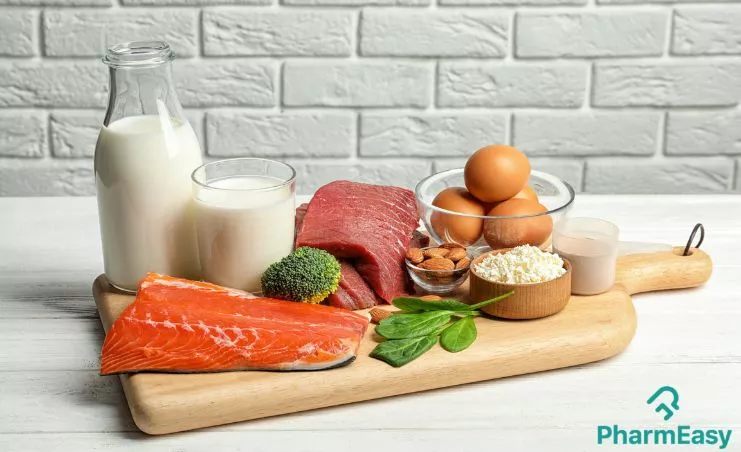
The daily requirement of protein may vary according to age, weight, gender, and level of physical activity. The nutritional value of proteins is measured by the number of amino acids. The recommended daily dose of protein is 46 grams for women and 54 grams for men1.
Proteins are vital for numerous bodily functions, including growth, muscle repair, immune function and the creation of enzymes and hormones. Without enough protein, the body can’t function properly, making it an essential part of a balanced diet.
Protein-rich foods benefit in weight management and aid metabolic health. They help to:
Protein suppresses your hunger by inhibiting hormones like ghrelin which increase appetite and stimulating those that are responsible for satiety. This helps to promote a feeling of fullness and prevents you from eating unnecessarily2.
Protein-rich foods contribute to overall energy levels and help maintain strength, making them an essential part of a balanced diet, especially for individuals with active lifestyles. These foods help in preserving the fat-free mass of the body which contributes to enhanced energy levels2.
Protein is considered the building block of muscles. Consuming adequate protein is particularly important for those engaged in strength training or resistance exercises to support muscle growth and repair.
Some studies3 have revealed that a diet rich in protein, especially animal protein may have a positive effect on bone mass density. Thus, a diet rich in protein can help lower the risk of fractures and osteoporosis, however, further research is needed to confirm this benefit.
Eating protein boosts your metabolism and may help you to burn excess fat faster. It also aids in weight loss by increasing the levels of amino acids in blood and enhancing utilization of glucose and fats2.
Incorporating a variety of protein sources into your diet may help reduce the risk of high blood pressure. Studies4 have shown that diets rich in diverse proteins, especially when combined with high fibre intake, are associated with lower blood pressure levels and a reduced risk of hypertension.
Protein is the building block of organs and tissues and so it helps promote recovery after exercise and injury. However, in case of any injuries, it’s important to follow doctor’s advice and recommendations on the appropriate diet for you.
One of the many effects of ageing is sarcopenia which is responsible for bone fractures, frailty and an overall lowered quality of life. Protein slows down the process of muscle deterioration and protects you from early sarcopenia.
According to the recommendations of the National Academy of Medicine, it is important for adults to consume a minimum of 0.8 grams of protein for every kilogram of body weight per day. This means that for every 20 pounds of body weight, you should aim to consume just over 7 grams of protein14.
Dr. Rajeev Singh, BAMS
Different foods contain different proteins, which have various roles in our body. There are 9 essential amino acids (units that form proteins) which are not naturally found in the body. Hence, we need to include foods in our diet to get these proteins for our bodies. Here are some high protein food options for you.

Boneless and skinless chicken breasts are one of the common and richest sources of protein. Bodybuilders and athletes usually include chicken breasts in their diet because it does not have saturated fat. Chicken breast contains approximately 21 to 22 grams of protein per 100 grams5.
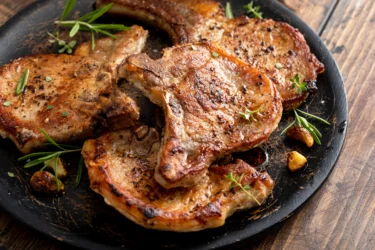
The pork tenderloin is considered as an extra-lean chop which is rich in proteins and has low-fat levels. 100 grams of pork contain approximately 20 grams of protein5.
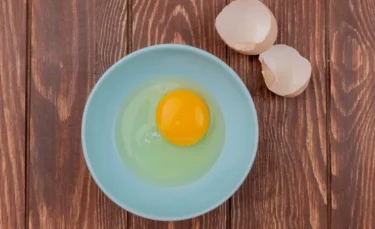
It is one of the excellent protein sources for ‘eggetarian’ people who do not eat meat or seafood. Egg contains almost all essential amino acids which are necessary for protein formation. You always think that egg yolk is more nutritious than egg white but that’s not true. Egg white is a pure form of protein than egg yolk with less saturated fat. Four egg whites have almost 14 to 15 grams of protein6.
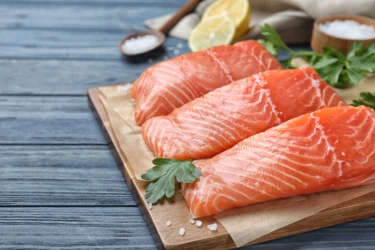
Seafood is a rich source of proteins with a lot of health benefits. Fish, like salmon, contain about 20 to 21 grams of proteins and usually have low fat5.
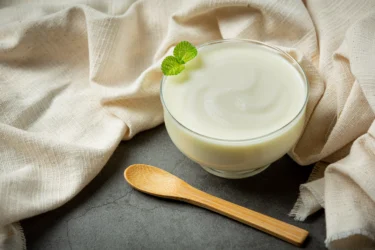
Greek yogurt is one of the tasty sources of proteins. It provides on average of 10 grams of protein in 100 grams7. Greek yogurt is more concentrated than regular yogurt hence it contains more proteins. Also, better to choose a plain Greek yogurt than a flavoured one as it may contain more carbohydrates and sugar.
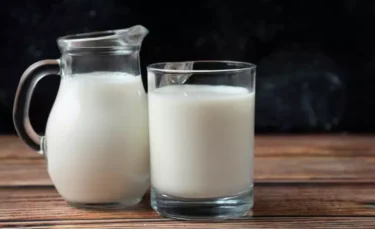
Milk is always considered as a complete food as it is full of proteins, carbohydrates, vitamins, calcium, minerals, etc. But always choose skimmed milk as it has more proteins and no fats and carbohydrates. It keeps your bones and teeth healthy and helps avoid the risk of osteoporosis. 1 cup (250 ml) of skimmed milk provides 8 to 10 grams of protein8.
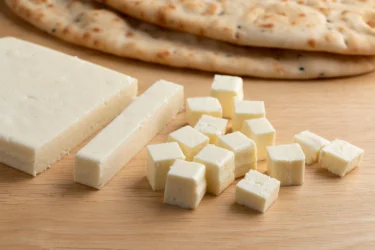
Paneer is great alternative to chicken for vegetarians. It is a rich source of casein protein. Paneer has 18 to 20 grams of protein per 100 grams5.
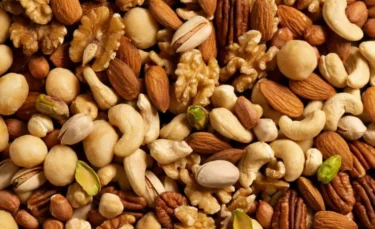
Nuts such as groundnuts, almonds, and peanuts are rich in proteins, unsaturated fats, and satiating fibres. They are slow-burning foods which keep your stomach full for a longer time and help reduce your cravings. ¼ cup (around 20 grams) of peanuts or almonds provide 5 to 6 gram of protein5,8.
Nut butters such as peanut butter and almond butter are also some newer healthy products that you can opt for. These are high in proteins, potassium, and fibres.
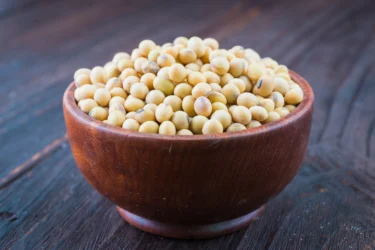
Soybean is also known as “meat without bones” because of its protein richness. It is available in various forms like soy yogurt, soya milk, roasted soybeans, etc. It is a great source of protein with very low fats. It contains 37 grams of protein per 100 grams5. Soybean is a great alternative for vegetarians and lactose-intolerant people.
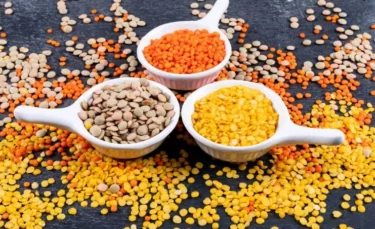
Lentils are also excellent for proteins for vegetarians. Both brown and yellow lentils contain about 22 to 24 grams of protein per 100 grams5.
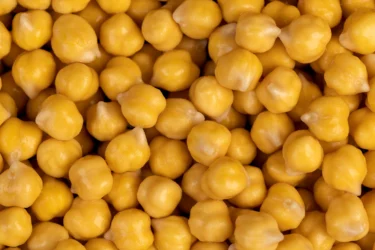
Chickpea curry is a common dish on Indian plates. It is one of the easiest protein-rich food available in India. Chickpeas are low in fat and high in proteins. It offers 20 to 23 grams of protein per 100 grams of chickpeas5.
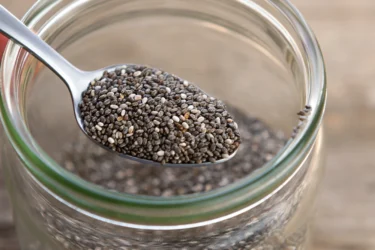
Seeds such as pumpkin seeds, sunflower seeds, chia seeds, hemp seeds, flax seeds are full of proteins. It also contains omega-3 fatty acids which are good for your immunity and heart and liver health. On an average 28g seeds provide around 6 to 9 grams of protein9.
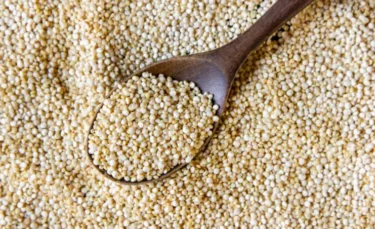
Quinoa is a gluten-free, plant food that is packed with all essential amino acids. There are 6 to 13 grams of proteins in 100 grams of Quinoa5.
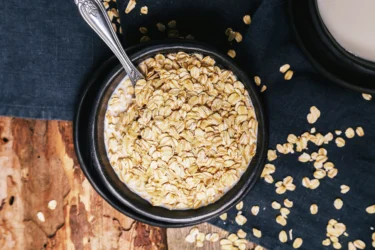
Oats are the new superfood for health-conscious people. They are an excellent source of protein. They contain 12 to 13 grams of protein per 100 grams10.
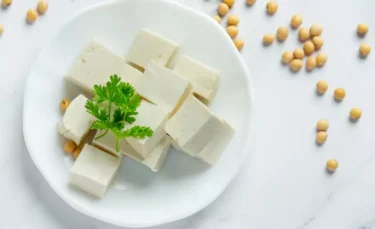
Tofu is full of proteins as it is prepared from soy milk. It also contains magnesium, copper, zinc, and vitamin B1. It is gluten-free and low in calories and helps with weight management. It contains around 8 grams of protein per 100 grams11.
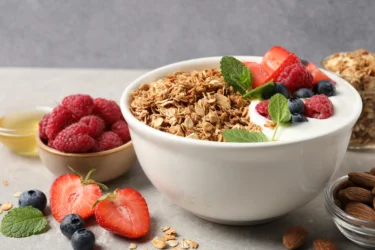
Granola is a healthy cereal that helps you lose weight when you pick a version that’s high in fibre. You can either consume a granola bar or have granola like cereal by mixing it with milk or Greek yoghurt for a high-powered yet light breakfast, perfect for hot summer months. A granola bar (100 grams) provides you with around 10 grams of protein12.
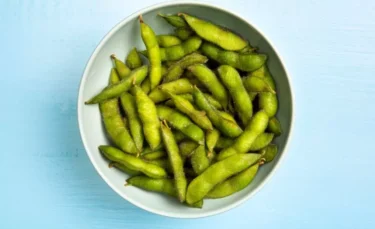
Edamame beans are high in protein and contain amino acids essential for the human body. About 100 grams of edamame beans offer around 11 to 12 grams of protein13. A medium-sized bowl of lightly cooked edamame beans pairs well with roti or rice.
Surprisingly, plant-based foods are actually the leading source of protein worldwide. They make up 57% of the daily protein intake, while meat only contributes 18%. This means that foods like legumes, grains, nuts and seeds play a significant role in meeting our protein needs15.
Dr. Smita Barode, B.A.M.S, M.S.
Also Read: 10 Health Benefits Of Black Coffee
While protein is essential for the body, excessive protein consumption, particularly from animal may have some side effects. Too much protein can cause uncomfortable digestive symptoms like constipation or diarrhoea. It may also lead to kidney strain and possibly other health problems. Additionally, a high-protein diet that includes a lot of saturated fat may cause weight gain. Therefore, balanced intake in line with individual needs is typically considered best.
Did you know that a cup of cooked lentils contains approximately 18 grams of protein and 15 grams of fibre? What’s more, lentils are low in saturated fat and sodium, making them a healthy choice for your diet. The high protein content of lentils can support muscle growth and repair, while fibre helps promote digestive health and aids in managing cholesterol levels14.
Dr. Siddharth Gupta, B.A.M.S, M.D (Ayu)
Also Read: What To Eat & Avoid During Malaria?
Protein is an important nutrient to keep your body healthy and fit. High protein foods help to keep you energetic and reduce food cravings, thus helping with weight management. There are various protein-rich food sources available around us which can easily be included in our diets, like chicken, egg whites, lentils, nuts, etc. But remember not to overdo it. Discuss with a dietician about your body’s protein needs and consume as per their advice. Also, if you have any medical conditions like kidney disease, consult your doctor about your diet, especially before incorporating any new food item in your routine.
Also Read: 11 Healthy Foods That Can Help You to Gain Weight
Yes, there are plenty of plant-based protein sources. Lentils, chickpeas, tofu, tempeh, quinoa and various nuts and seeds are great examples. By eating a varied and balanced diet, vegetarians and vegans can easily meet their protein needs.
Some healthy and high-protein snacks include Greek yogurt, cottage cheese, hard-boiled eggs, edamame, protein bars or shakes made with whole ingredients and mixed nuts.
Most people can get enough protein from whole foods and don’t need supplements. However, athletes, bodybuilders or those with specific dietary restrictions may benefit from protein supplements such as whey or plant-based protein powders.
Complete proteins contain all nine essential amino acids in the right proportions, while incomplete proteins lack one or more of these amino acids. Animal proteins are usually complete, while many plant proteins are incomplete. However, a varied plant-based diet can provide all essential amino acids, for instance, cereal and pulses combination can give you this.
While protein is indeed vital for muscle growth and repair, its role in the body is multifaceted. It’s also essential for proper immune function, enzyme and hormone production, maintaining healthy skin and hair and much more.
Disclaimer: The information provided here is for educational/awareness purposes only and is not intended to be a substitute for medical treatment by a healthcare professional and should not be relied upon to diagnose or treat any medical condition. The reader should consult a registered medical practitioner to determine the appropriateness of the information and before consuming any medication. PharmEasy does not provide any guarantee or warranty (express or implied) regarding the accuracy, adequacy, completeness, legality, reliability or usefulness of the information; and disclaims any liability arising thereof.
Comments

Leave your comment...

View all comments(1)
You may also like
Give walnuts and almonds on thi website and also provided a natural fanatasy on a providing a calm and frequency of heating to provide a necessary process…so you should adding a molecule of water hypothesis to reaction